
Less Paperwork, More Blockchain: SEC Embraces Competition for Crypto
Vladlena Klymova
September 18, 2025
Earlier this month, the Securities and Exchange Commission (SEC) announced a new set of priorities for revamping crypto regulation, another step on the ambitious path towards wholesale regulatory reform. The agency’s agenda to refine the rules governing digital assets and decentralized finance will invigorate new competition and may reshape the U.S. financial markets.
SEC chairman Paul Atkins emphasized that “the items on the agenda represent the Commission’s renewed focus on supporting innovation, capital formation, market efficiency, and investor protection” and reaffirmed the agency’s commitment to continuing “withdrawal of a host of items from the last Administration that do not align with the goal that regulation should be smart, effective, and appropriately tailored within the confines of our statutory authority.”
This agenda’s main focus in this reform effort is to “help clarify the regulatory framework for crypto assets and provide greater certainty to the market.” Among the reforms advanced are proposals to “include certain exemptions and safe harbors” and “allow for crypto to be traded on national securities exchanges and alternative trading systems.” If enacted, these cooperative provisions would bolster the innovative dynamism of the digital asset industry––its emerging crypto markets and its digital start-ups. The agency also aims to reduce burdensome compliance and disclosure rules and streamline the integration of crypto into traditional financial markets.
Alongside other declared intentions, this announcement reinforces growing optimism about the SEC’s current trajectory towards regulatory decluttering. The ongoing efforts to break with the Biden-era policy of statutory overreach align with a broader initiative by the Trump administration to uphold “US leadership in blockchain innovation, capital formation, and regulatory standard setting” (as Latham & Watkins summarized the White House’s intentions). In January, President Trump’s issued executive order on digital assets, which declared the administration’s intention “to make America the ‘crypto capital of the planet.’”
In light of recent improvements in the SEC’s strategy, it is worth underscoring the dangers of the more adversarial approach pursued by the previous administration under the guise of risk management and allegedly prudent regulation. Former SEC Chairman Gary Gensler neglected the part of its mission dealing with “facilitating capital formation” to focus more on “protecting investors.” However, experts such as David Bahnsen from the Bahnsen Group credit American exceptionalism in capital markets to the “economic framework that incentivizes risk-taking.” He argues: “The United States has long used innovations in financial markets to facilitate risk-taking and the deployment of capital to all sorts of economic endeavors, and we have reaped the rewards.” It is the reason “why the United States has been so incredibly ‘investable’ for so long.” Competition without risk-taking is competition sheltered, and therefore, the notion that “competition is good, but risk is bad,” which underlies any regulatory “system of some competition, but with all sorts of risk moderation,” is oxymoronic. That confusion can be seen in the previous administration’s agency mission creep.
The first results of the SEC’s new framework appeared quickly. Only four days after the press release, CNBC reported that the U.S. Bank’s resumed offering of crypto custody services and covered the launch of the first tokenized public shares offering on a blockchain platform. Both developments quickly followed the SEC’s latest statements. In the words of Alex Thorn, the head of research at Galaxy Digital, “regulatory changes and reforms in the U.S. are a big catalyst” for its pioneering strategy to ensure access to capital markets. Robert Leshner (CEO of Superstate) argues that bringing tokenization to the mainstream will greatly increase the market’s competitiveness, enable 24/7 trading, and introduce new classes of investors to capital markets.
Such news stories showcase why limiting administrative intervention is crucial for greater innovation, stronger competitiveness, and enhanced consumer choice in investing. Enforcement is costly, and compliance is burdensome, which is why easing the need for both by removing red tape ultimately benefits taxpayers in the form not only of direct savings but also of growing market capitalization, a greater diversity of financial products, and innovative economic solutions.
